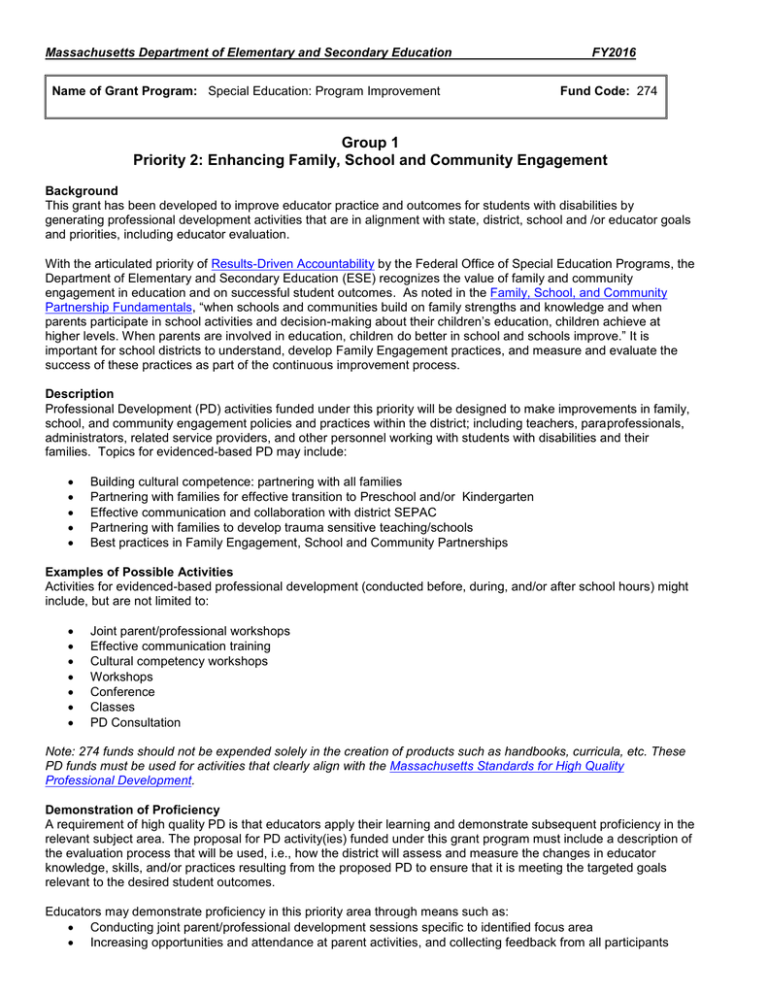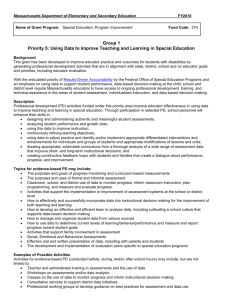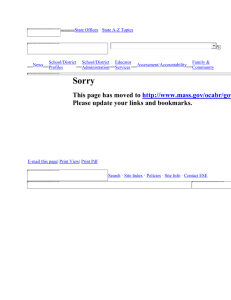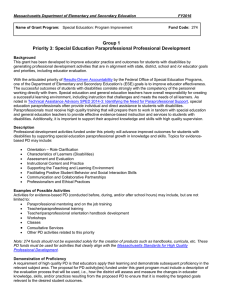PartIIIa Group1Priority2
advertisement

Massachusetts Department of Elementary and Secondary Education Name of Grant Program: Special Education: Program Improvement FY2016 Fund Code: 274 Group 1 Priority 2: Enhancing Family, School and Community Engagement Background This grant has been developed to improve educator practice and outcomes for students with disabilities by generating professional development activities that are in alignment with state, district, school and /or educator goals and priorities, including educator evaluation. With the articulated priority of Results-Driven Accountability by the Federal Office of Special Education Programs, the Department of Elementary and Secondary Education (ESE) recognizes the value of family and community engagement in education and on successful student outcomes. As noted in the Family, School, and Community Partnership Fundamentals, “when schools and communities build on family strengths and knowledge and when parents participate in school activities and decision-making about their children’s education, children achieve at higher levels. When parents are involved in education, children do better in school and schools improve.” It is important for school districts to understand, develop Family Engagement practices, and measure and evaluate the success of these practices as part of the continuous improvement process. Description Professional Development (PD) activities funded under this priority will be designed to make improvements in family, school, and community engagement policies and practices within the district; including teachers, paraprofessionals, administrators, related service providers, and other personnel working with students with disabilities and their families. Topics for evidenced-based PD may include: Building cultural competence: partnering with all families Partnering with families for effective transition to Preschool and/or Kindergarten Effective communication and collaboration with district SEPAC Partnering with families to develop trauma sensitive teaching/schools Best practices in Family Engagement, School and Community Partnerships Examples of Possible Activities Activities for evidenced-based professional development (conducted before, during, and/or after school hours) might include, but are not limited to: Joint parent/professional workshops Effective communication training Cultural competency workshops Workshops Conference Classes PD Consultation Note: 274 funds should not be expended solely in the creation of products such as handbooks, curricula, etc. These PD funds must be used for activities that clearly align with the Massachusetts Standards for High Quality Professional Development. Demonstration of Proficiency A requirement of high quality PD is that educators apply their learning and demonstrate subsequent proficiency in the relevant subject area. The proposal for PD activity(ies) funded under this grant program must include a description of the evaluation process that will be used, i.e., how the district will assess and measure the changes in educator knowledge, skills, and/or practices resulting from the proposed PD to ensure that it is meeting the targeted goals relevant to the desired student outcomes. Educators may demonstrate proficiency in this priority area through means such as: Conducting joint parent/professional development sessions specific to identified focus area Increasing opportunities and attendance at parent activities, and collecting feedback from all participants Providing opportunities for training on evidence- based strategies in understanding and developing cultural competency Training and consultation supports to develop strategies for engaging families in the positive behavioral support process Training and consultative services that support implementation of evidence-based strategies and programs such as mediation, conflict resolution, restorative justice, trauma sensitive teaching, and positive behavioral interventions and supports Systemic practices that result in a decline in the delay of the implementation of IEP supports for Early Childhood transition Conducting home-visits and building partnerships with families of the early childhood student Developing district-wide Family Engagement strategies that are directly connected to identified focus area Assessing and establishing system-wide Family Engagement policy and practices Increasing SEPAC development, and collaboration in district initiatives In order to better disseminate promising practices statewide, ESE may request that districts share information about and outcomes resulting from this PD. Training and Networking Opportunities The ESE will offer districts the opportunity to attend one or more statewide training and networking meetings in 20152016 related to these priorities. These meetings may include opportunities for focused training and technical assistance, collaboration, and the sharing of best practices in this priority area and the others identified in the RFP. More information about these meetings will be announced in the fall of 2015. OVERVIEW OF FUND CODE 274 NARRATIVE REQUIREMENTS Professional Development Assurances Statement A. Overview: Please select one of the following FY2016 priorities. All professional development (PD) in this application must align with the selected priority below. 1. Which priority will the proposed PD address? 2. Choose the topic(s) that best aligns with the proposed professional development. B. Propose the activity(ies) to be funded through the 274 grant: 1. Identify and briefly describe the proposed PD activity(ies). 2. Identify the goal(s) and objective(s) for the proposed PD. Note: Goal(s)/objective(s) must target improvement in educator practice and demonstrate a relationship to student outcomes. For the priority selected, the proposal must identify one SMART Goal for student learning outcomes and one for educator learning outcomes. If more than one activity is intended to be funded under this priority, outcomes must be aligned as described in the SMART Goals. a. SMART Goal – Learning outcomes for students with disabilities (Smart Goal Definition: Specific and strategic; measurable; action-oriented; rigorous, realistic, results-focused; timed/tracked) b. SMART Goal – Learning outcomes for Educators (Smart Goal Definition: Specific and strategic; measurable; action-oriented; rigorous, realistic, results-focused; timed/tracked) c. Does the proposed PD support any state, district, school, and/or educator goals or priorities? Please Explain. 3. For each activity, provide a proposed timeline, including the number of contact hours and the name(s) of provider(s). Note: If you are proposing individualized, rather than school or district-wide PD and have yet to identify a provider(s), please describe the type of provider you will be seeking and how you will ensure that the selected professional development will be aligned with the above priority and contribute to district professional development goals. 4. Describe the job embedded activities or plans for participants to apply their learning to the particular content and/or context. 5. Identify the professional role(s) of targeted participants District Level Administrators Special Education Teachers Principals Parents Teachers Paraprofessionals Related Service Providers Other____________________ C. Data-based Rationale for PD Activities: 1. What data did you analyze that led you to this proposed PD? IDEA Part B State Performance Indicator Data IDEA Part B Determination Level Data Performance Data MCAS Results Teacher Surveys Conditions for School Effectiveness Data School Safety Discipline Report Other____________________ 2. Based on the data you analyzed, what is the rationale for the proposed PD? D. Outcomes and Evaluation: How will you assess and measure the changes in educator knowledge, skills, and/or practices resulting from the proposed PD to ensure that it is meeting the targeted goals relevant to the desired student outcomes?





